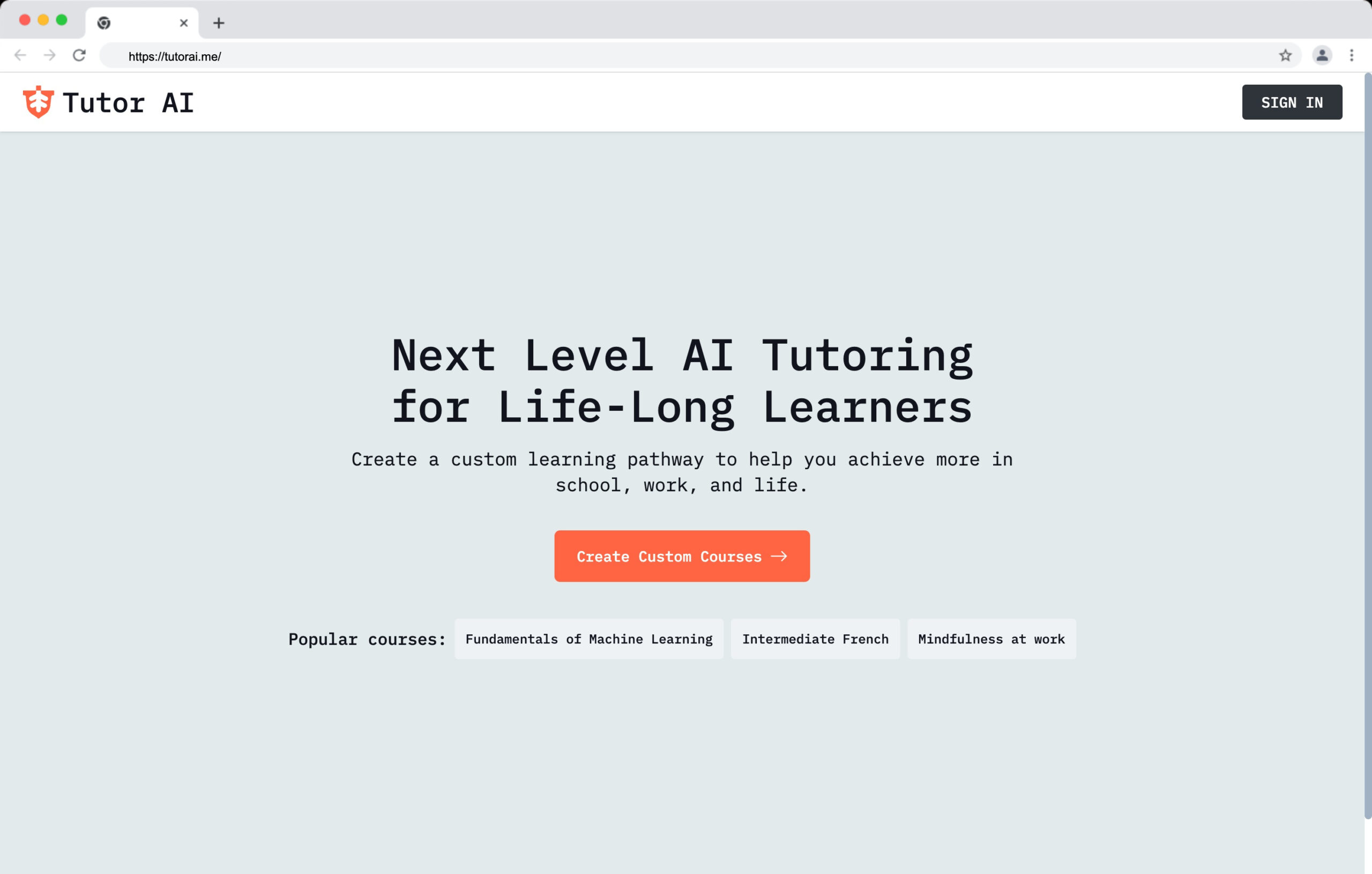AI summary apps are becoming must-have tools for students, educators, and professionals who want to understand large volumes of content in less time.
Whether you’re reviewing a 50-page PDF, catching up on a missed lecture, or helping students prep for exams, these apps can save hours of reading and boost comprehension.
Over the past year, I’ve tested dozens of AI summarization tools in real tutoring environments.
Below are my recommendations for 2025 — each one selected based on accuracy, speed, affordability, and usefulness in tutoring and academic settings.
Quick Comparison Table
Quick Comparison Table
| App | Best For | Starting Price | File Types | Audio Support | Free Plan |
|---|---|---|---|---|---|
| Scholarcy | Research & academic content | $9.99/month | PDF, Word | No | Yes |
| Eightify | YouTube videos | $4.99/month | YouTube URLs | No | Yes |
| ChatGPT | Versatility | $20/month (GPT-4) | Text, PDFs, Web | No | Yes |
| SciSummary | STEM summaries | $12.99/month | PDFs | No | Free trial |
| QuillBot | Essays and paragraphs | $19.95/month | Text, PDFs, Docs | No | Yes |
| TLDR This | Web page content | $4.99/month | URLs, Text | No | Yes |
| SMMRY | Simple summaries | Free | Text, PDFs | No | Yes |
| Notta | Lecture recordings | $13.99/month | Audio, Video | Yes | Yes |
| Resoomer | Argumentative essays | $8.90/month | Web, PDFs | No | Yes |
1. Scholarcy — Best for Academic Research
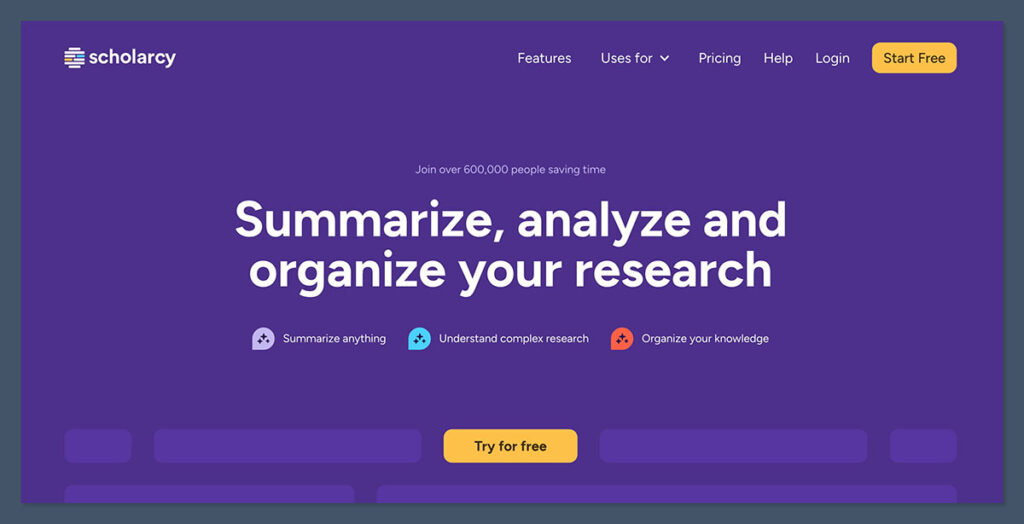
Rating: 4.8/5
Starting price: $9.99/month
Free plan: Yes
Best for: Students and tutors working with research papers
Scholarcy transforms complex academic texts into clean, structured summaries. It’s especially helpful for condensing scientific papers, highlighting methods, results, and cited references.
Pros
- Scholarcy breaks academic papers into structured summaries with labeled sections like Introduction, Methods, and Findings.
- It integrates with research tools such as Zotero and Mendeley for faster referencing.
- The platform allows you to export your summaries into Word and PowerPoint formats.
Cons
- The app only works with written documents and does not support video or audio content.
- Scholarcy is less effective with informal or non-academic writing.
Pricing
- The free version allows a limited number of summaries each day with watermarked outputs.
- The premium plan starts at $9.99/month and includes unlimited summaries, export features, and integrations with popular research tools.
Bottom Line
Scholarcy is ideal for academic environments where detailed research papers need to be simplified quickly and accurately.
2. Eightify — Best for YouTube Summaries
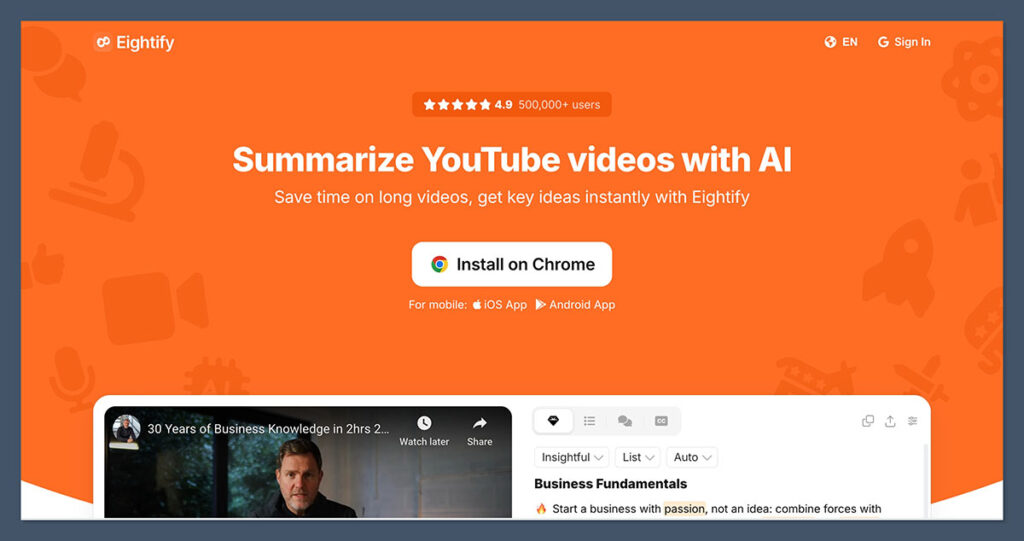
Rating: 4.5/5
Starting price: $4.99/month
Free plan: Yes
Best for: Breaking down educational YouTube content
Eightify creates structured, timestamped summaries of YouTube videos directly inside your browser. It’s designed for students and educators who rely on video learning.
Pros
- The extension works directly in YouTube and shows real-time summaries while watching.
- It breaks long lectures or interviews into distinct sections using timestamps and topic tags.
- Summaries are easy to scan and help users skip to relevant parts quickly.
Cons
- The tool is currently limited to Google Chrome and does not support Firefox or Safari.
- Eightify does not work with private, unlisted, or restricted videos.
Pricing
- The free version includes up to three summaries per week.
- The Pro plan costs $4.99/month and includes unlimited video summaries and early access to new features.
Bottom Line
If you regularly learn through video, especially on YouTube, Eightify is a reliable way to capture the key points without watching the entire video.
3. ChatGPT (GPT-4) — Most Versatile Summary Tool
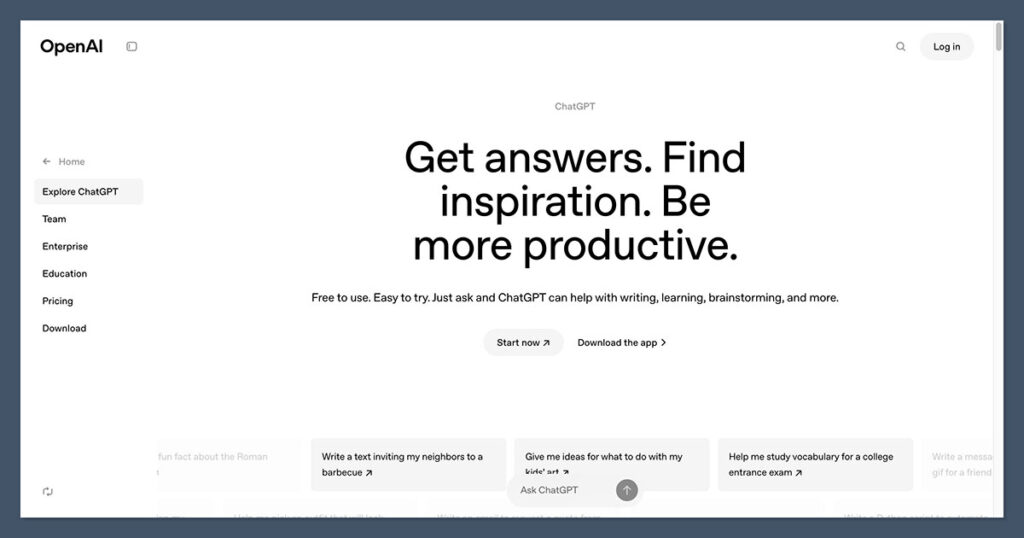
Rating: 5.0/5
Starting price: $20/month
Free plan: Yes (GPT-3.5)
Best for: Summarizing anything — text, files, notes, PDFs
ChatGPT with GPT-4 can summarize nearly any content — from textbooks and PDFs to articles and transcripts — with full control over tone, style, and format.
Pros
- ChatGPT supports multi-format input including text, PDF files, and pasted notes.
- It allows you to request specific types of summaries, such as bulleted lists, simplified explanations, or paragraph overviews.
- You can follow up with clarifying questions or request alternative formats instantly.
Cons
- File upload and advanced features are only available with the paid plan.
- Users must learn to write effective prompts to consistently get high-quality summaries.
Pricing
- The free version uses GPT-3.5 and does not support file uploads.
- The Plus plan at $20/month includes GPT-4 Turbo, file support, and the ability to build or use custom GPTs.
Bottom Line
If you want a tool that does everything from summarizing PDFs to explaining lecture notes in plain English, ChatGPT is the most flexible option available today.
4. SciSummary — Best for Science-Based Summaries
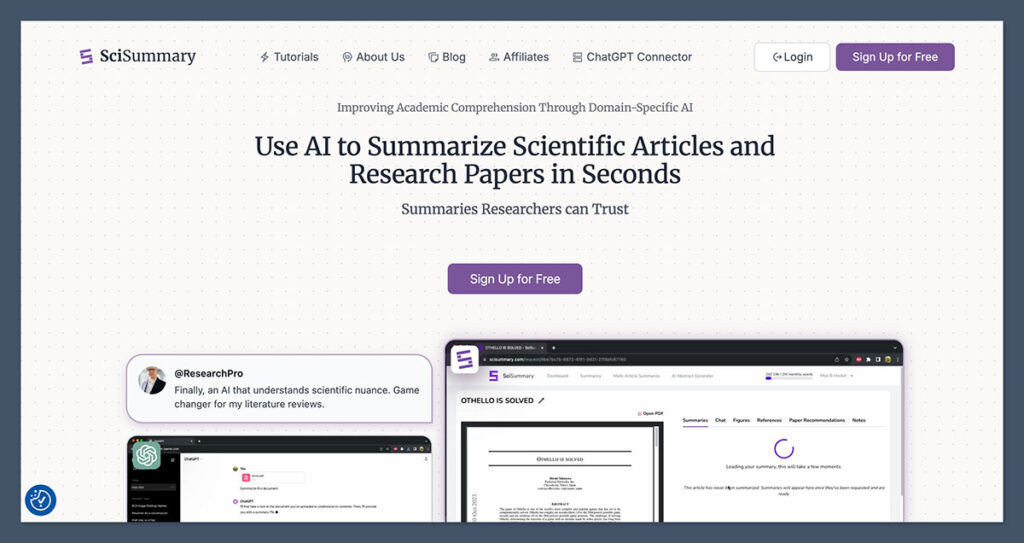
Rating: 4.4/5
Starting price: $12.99/month
Free plan: Trial only
Best for: Students and professionals in science or engineering
SciSummary is designed to handle technical, research-heavy documents — especially in STEM fields — and condenses them into short, factual summaries.
Pros
- SciSummary can process long scientific papers and highlight core elements like hypotheses, methods, and conclusions.
- It produces clear, factual summaries with minimal fluff, which helps students focus on understanding results.
- Users can submit documents via web upload or email for fast turnarounds.
Cons
- The tool is designed only for text-based documents and does not support media or web content.
- It lacks collaboration tools for use in group learning environments.
Pricing
- The free trial includes three summary credits.
- The premium plan starts at $12.99/month and includes unlimited summaries, faster processing, and email-based support.
Bottom Line
SciSummary is one of the few tools built specifically for summarizing scientific literature, making it essential for STEM students.
5. QuillBot Summarizer — Best for Essay Support
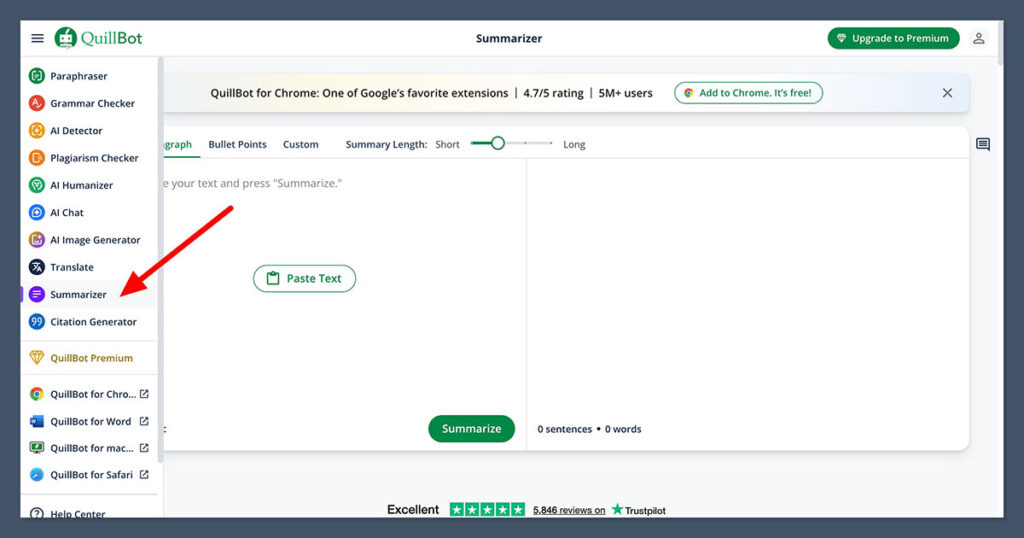
Rating: 4.3/5
Starting price: $19.95/month
Free plan: Yes
Best for: Summarizing and editing academic essays
QuillBot’s summarizer helps students condense and revise their essays by offering two modes: paragraph-style and key-sentence extraction.
Pros
- QuillBot lets you select summary length and format with an easy-to-use slider.
- The summarizer integrates with Google Docs and Chrome, which is useful during the writing process.
- It includes built-in paraphrasing tools to help refine writing.
Cons
- The tool does not handle audio or video input.
- The free version imposes a character limit, which makes it difficult to summarize full-length essays.
Pricing
- The free version supports up to 1,200 characters per summary.
- The premium plan at $19.95/month includes unlimited summaries, advanced writing tools, and access to other QuillBot features like paraphrasing and grammar checking.
Bottom Line
For students focused on writing and revising essays, QuillBot is a valuable all-in-one tool that supports both summarization and content refinement.
6. TLDR This — Best for Web Content
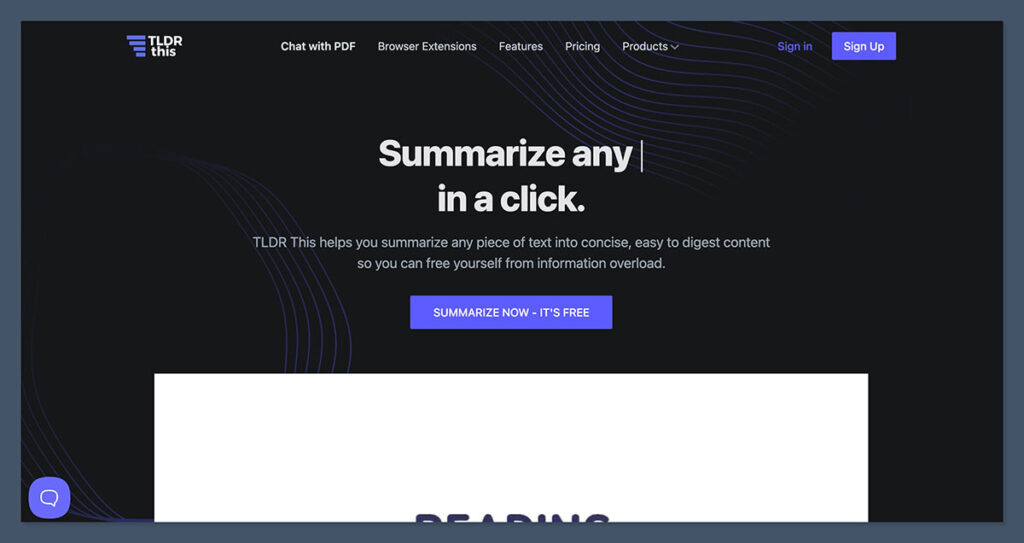
Rating: 4.1/5
Starting price: $4.99/month
Free plan: Yes
Best for: Summarizing blog posts, news, and articles
TLDR This is a lightweight browser tool that summarizes online content with one click, offering both article and scientific summary modes.
Pros
- TLDR This provides instant summaries of web content without requiring a copy-paste.
- It includes a scientific mode that’s useful for academic readings.
- The Chrome extension integrates directly into your browsing experience.
Cons
- The tool cannot summarize PDF documents or other file uploads.
- Accuracy varies when handling more complex or academic texts.
Pricing
- The free plan includes five summaries per day and displays ads.
- The premium plan costs $4.99/month and includes unlimited use, ad-free browsing, and faster processing. The annual plan is $39.99/year.
Bottom Line
For casual reading, quick research, or daily browsing, TLDR This provides fast and useful web summaries.
7. SMMRY — Best Free Summary Tool
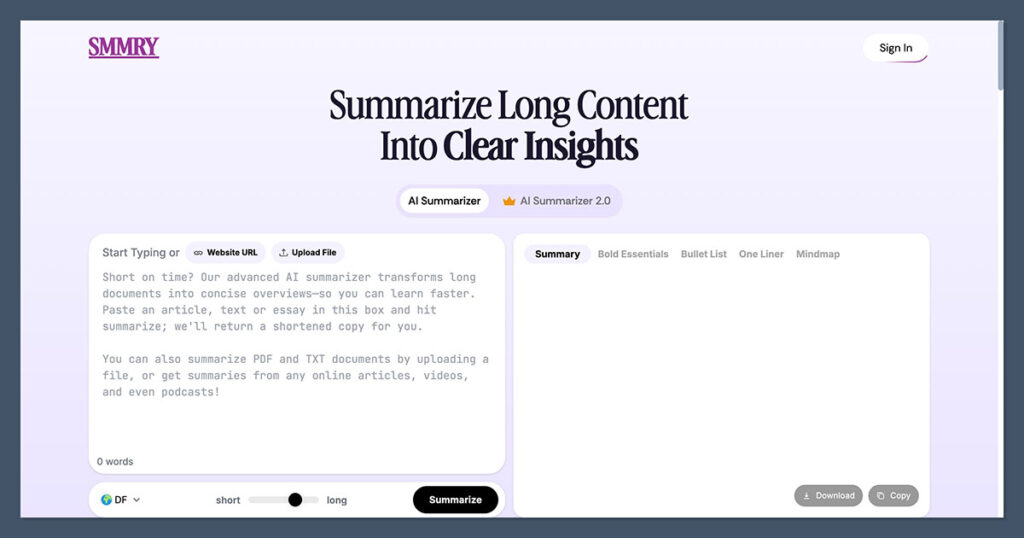
Rating: 3.9/5
Starting price: Free
Free plan: Yes
Best for: Fast, no-login summaries
SMMRY is a simple, free tool that strips down content into the most essential points without requiring sign-up or payment.
Pros
- SMMRY offers a fast, ad-free experience that works well for basic summarizing needs.
- It allows you to upload documents or paste in long text for instant summaries.
- The tool is fully browser-based and does not store user data.
Cons
- It lacks customization options and does not allow for format adjustments.
- The summarizer may produce generic or overly simplified results on complex topics.
Pricing
- SMMRY is entirely free and does not offer a paid version.
Bottom Line
If you want a zero-friction, free summarizer for quick tasks, SMMRY is a handy option with no setup required.
8. Notta — Best for Lecture Recording & Summarization
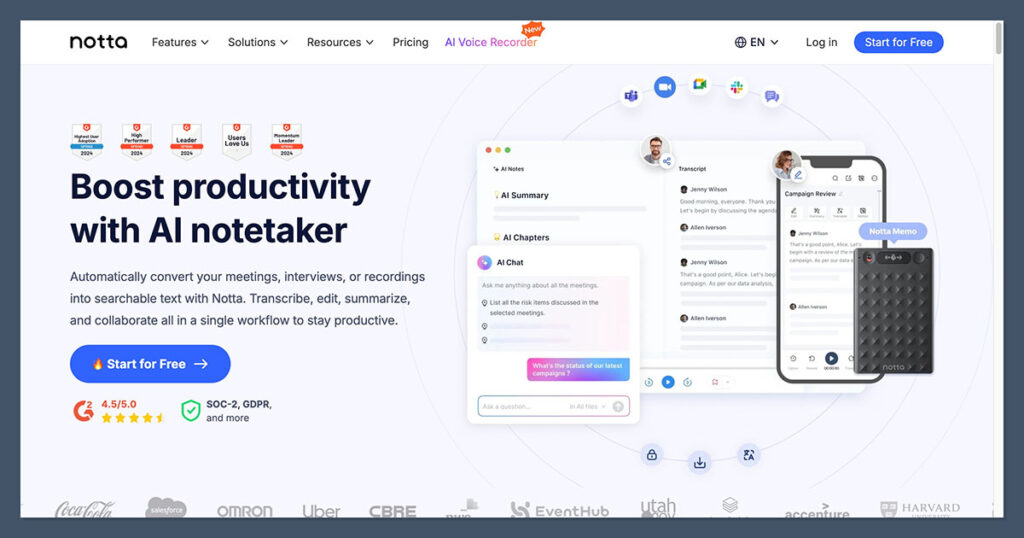
Rating: 4.2/5
Starting price: $13.99/month
Free plan: Yes
Best for: Recording and summarizing live classes
Notta records live audio, transcribes it into text, and then generates a concise summary — ideal for students and tutors alike.
Pros
- Notta captures audio and video from meetings or lectures and transcribes them with high accuracy.
- It provides cloud syncing, editing tools, and keyword search features to help organize summaries.
- The platform is available on both desktop and mobile apps.
Cons
- Free users face monthly transcription limits and cannot upload video files.
- Background noise can affect transcription accuracy.
Pricing
- The free plan includes 120 minutes per month and basic transcription tools.
- The premium plan costs $13.99/month or $139.90/year and includes 1,800 minutes/month, video upload support, and advanced export formats.
Bottom Line
Notta is ideal for reviewing tutoring sessions, missed lectures, or any spoken content that needs to be summarized and archived.
9. Resoomer — Best for Argumentative Writing
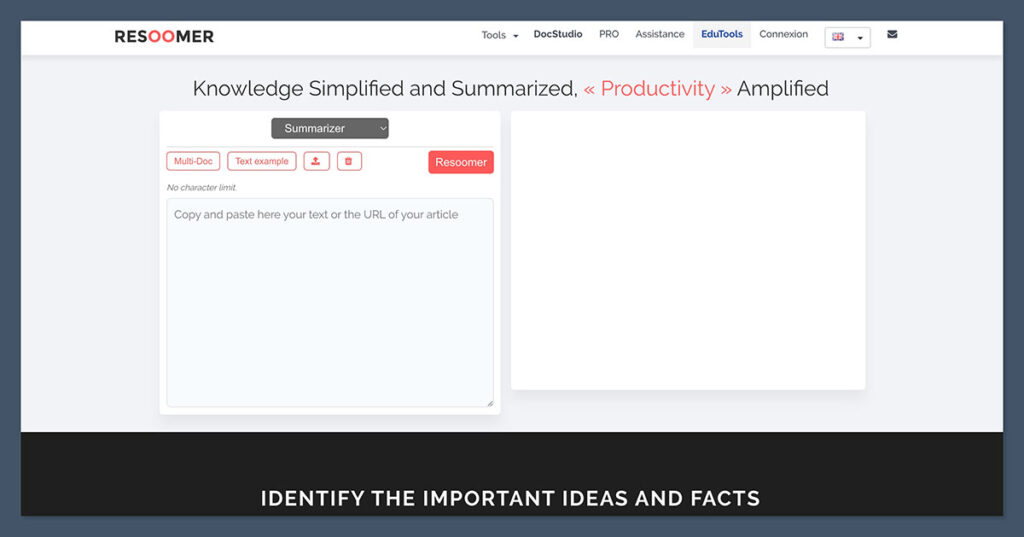
Rating: 4.0/5
Starting price: $8.90/month
Free plan: Yes
Best for: Summarizing logic-driven texts like essays or philosophy
Resoomer is designed to identify thesis statements, arguments, and logical flow, making it perfect for humanities, debate prep, or persuasive writing.
Pros
- Resoomer highlights the structure of arguments and summarizes content based on logic and reasoning.
- It supports multiple languages and can handle content from web pages or uploaded files.
- The output format is structured and easy to follow.
Cons
- The tool struggles with non-linear or creative writing formats.
- It does not support summarizing video or audio content.
Pricing
- The free version includes basic summaries and browser extension access.
- The premium plan at $8.90/month includes detailed analysis, export tools, and high-speed processing.
Bottom Line
Resoomer is a strong choice for summarizing persuasive essays, legal briefs, or philosophical texts where argument clarity matters most.
Final Verdict: Which AI Summary App Should You Use?
Here’s a comparison to help you decide:
| Use Case | Best App | Starting Price |
|---|---|---|
| Academic papers | Scholarcy | $9.99/month |
| YouTube lectures | Eightify | $4.99/month |
| Versatile use | ChatGPT | $20/month |
| STEM content | SciSummary | $12.99/month |
| Essay and writing help | QuillBot | $19.95/month |
| Web page summarizing | TLDR This | $4.99/month |
| Free, no-signup tool | SMMRY | Free |
| Recording classes | Notta | $13.99/month |
| Argument-based content | Resoomer | $8.90/month |
Whether you’re helping students prep for exams or reviewing content for tutoring sessions, there’s an AI summary tool on this list that fits the task.
Choosing the right one comes down to the content you’re working with and how much flexibility you need.
